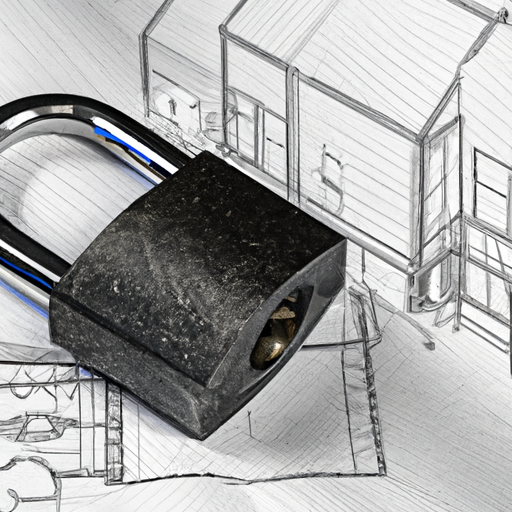In today’s digital age, privacy has become an increasingly important concern, especially for businesses involved in the construction industry. As a home builder, you understand the value of protecting your customers’ personal information and ensuring the confidentiality of sensitive data. This article aims to provide you with a comprehensive understanding of the privacy policy for home builders, outlining the key considerations, legal obligations, and best practices to help safeguard your clients’ privacy. By incorporating these guidelines into your business operations, you can not only build trust with your customers but also mitigate potential legal risks.

Privacy Policy for Home Builders
In today’s digital age, privacy has become a paramount concern for individuals and businesses alike. As a home builder, it is essential to have a comprehensive and transparent privacy policy that outlines how you handle and protect the personal information of your customers. This article aims to provide you with a complete understanding of what a privacy policy is, why home builders need one, how to comply with data protection laws, what personal information is collected, how it is collected and used, and how it is shared with third parties. Additionally, it will address user rights, data protection measures, and children’s privacy.
What is a Privacy Policy?
A privacy policy is a legal document that informs individuals about the types of personal information collected by an organization, how the information is used and shared, and the measures taken to protect that information. It serves as a means of transparency and ensures that individuals are aware of their rights and how their data is being handled. A privacy policy also outlines the legal requirements that organizations must comply with when collecting and processing personal information.
Why do Home Builders Need a Privacy Policy?
As a home builder, implementing a privacy policy is crucial for several compelling reasons.
Building Trust and Credibility
Having a comprehensive privacy policy demonstrates your commitment to protecting your customers’ personal information. It helps build trust and credibility with your clients, as they see that you prioritize their privacy and treat their data with care and respect.
Compliance with Privacy Laws
Privacy laws around the world require businesses to have a privacy policy in place. Failing to comply with these legal requirements can result in severe penalties and damage to your reputation. By maintaining a privacy policy, you demonstrate your commitment to adhering to the legal obligations surrounding data protection.
Protection of Customer Data
By having a privacy policy, you outline the procedures and safeguards you have implemented to protect your customers’ personal information from unauthorized access, use, or disclosure. This serves as reassurance for your customers that you take their privacy seriously and have measures in place to mitigate any potential risks.
Information Security Measures
A privacy policy provides an opportunity to highlight the security measures you have in place to protect personal information from breaches, cyberattacks, and unauthorized access. This creates peace of mind for your customers, knowing that their data is safeguarded against potential threats.
Privacy Policy Compliance with Data Protection Laws
To ensure your privacy policy is compliant with data protection laws, you must consider various regulations that apply to your home building business. While the specific laws may vary depending on your jurisdiction, there are key regulations you should be aware of:
General Data Protection Regulation (GDPR)
If you operate in the European Union (EU) or process personal data of individuals within the EU, you must comply with the GDPR. This regulation outlines specific requirements for collecting, processing, and storing personal data, as well as ensuring individuals’ rights regarding their data.
California Consumer Privacy Act (CCPA)
Home builders operating in or serving customers in California must comply with the CCPA. This law grants California residents the right to know what personal information is collected and how it is used, as well as the ability to request deletion of their data and opt-out of data sharing.
Other Applicable Privacy Laws
Depending on your business’s location and the jurisdictions you operate in, there may be additional privacy laws that you need to adhere to. Conduct thorough research or seek legal advice to ensure compliance with the relevant regulations.
What Personal Information is Collected by Home Builders?
As a home builder, you may collect various types of personal information to fulfill your contractual obligations and provide tailored services to your customers. The information collected may include:
Contact Information
This includes names, addresses, email addresses, and phone numbers. Collecting this information allows you to communicate with your customers effectively.
Financial Information
To facilitate payment transactions or secure loans for your customers, you may collect financial information such as credit card details, bank account numbers, and income verification.
Building Preferences
Understanding your customers’ preferences regarding home design, layout, and features allows you to offer personalized services and create dream homes that meet their specific requirements.
Other Relevant Personal Information
Depending on the nature of your business, you may collect additional information such as demographic details, employment history, and references to assess eligibility for home financing or mortgage applications.
How is Personal Information Collected?
Home builders collect personal information through various channels and interactions with customers. These include:
Website and Online Forms
Through your website, customers can provide personal information via online forms, including contact forms, registration forms, or loan applications.
In-person Meetings and Conversations
During face-to-face meetings, site visits, or conversations, customers may disclose personal information relevant to their home building project.
Surveys and Feedback
You may collect personal information through surveys or feedback forms that aim to gather customer preferences, opinions, or satisfaction levels.
Other Sources
Personal information may also be obtained from third-party sources, such as real estate agents, brokers, or credit bureaus, with the customer’s consent.
Purpose of Collecting Personal Information
As a home builder, you collect personal information for specific purposes, which may include:
Contractual Obligations
To fulfill your contractual obligations with customers, you require personal information to establish agreements, process payments, and deliver the agreed-upon services.
Improving Services
Access to customers’ personal information enables you to enhance your services by identifying trends, preferences, and areas where improvements can be made.
Customization and Personalization
Understanding customers’ building preferences and requirements allows you to offer tailored services, which can result in greater customer satisfaction and loyalty.
Marketing and Communication
With customers’ consent, personal information can be used for marketing and communication purposes, such as sending newsletters, promotions, or updates about your offerings. However, it is crucial to obtain proper consent and provide opt-out options.
How Home Builders Use and Store Personal Information
As a responsible home builder, you must ensure that personal information is processed lawfully and kept secure. Here are the key considerations when using and storing personal information:
Lawful Processing of Personal Information
Before collecting and processing personal information, you must have a lawful basis for doing so. This may include obtaining the individual’s consent, fulfilling contractual obligations, or complying with legal requirements.
Data Storage and Security Measures
Personal information should be stored securely, whether in physical or electronic form. Implement appropriate security measures, such as encryption, firewalls, access controls, and regular security assessments, to maintain the confidentiality and integrity of the data.
Data Retention Policies
Establish clear data retention policies that outline how long personal information will be retained. Ensure that the retention period aligns with legal requirements and the purpose for which the information was collected. Once no longer needed, personal information should be securely disposed of or anonymized.
Sharing Personal Information with Third Parties
As a home builder, you may need to share personal information with third parties to fulfill your contractual obligations or provide certain services. It is crucial to have appropriate safeguards in place and ensure compliance with privacy laws. Here are the key considerations when sharing personal information:
Service Providers
You may engage third-party service providers, such as subcontractors, architects, or suppliers, who require access to personal information to deliver their services. It is essential to have contractual agreements that address data protection obligations and limit the use of personal information to the intended purpose.
Business Partners
Collaborating with business partners, such as real estate agents or lenders, may involve sharing personal information. Before sharing any data, ensure that your partners have robust privacy policies and data protection measures in place.
Legal Obligations
Under certain circumstances, you may be required by law or regulations to share personal information. This includes cooperating with law enforcement agencies or responding to court orders or legal processes. Ensure that such disclosures comply with applicable laws and maintain transparency with the individuals affected.
Frequently Asked Questions
What is the purpose of a privacy policy?
A privacy policy outlines how an organization collects, uses, and protects personal information. It provides transparency to individuals and ensures compliance with privacy laws.
Do home builders need a privacy policy?
Yes, home builders need a privacy policy to demonstrate their commitment to protecting customer data, comply with privacy laws, and build trust with their clients.
What personal information do home builders collect?
Home builders may collect personal information such as contact details, financial information, building preferences, and other relevant information required to fulfill contractual obligations.
How is personal information collected?
Personal information may be collected through online forms, in-person meetings, surveys, feedback, and other relevant interactions between the home builder and the customer.
How do home builders use and store personal information?
Home builders use personal information for contractual obligations, service improvements, customization, and marketing purposes. The information is stored securely and processed lawfully, adhering to data protection measures.
Is personal information shared with third parties?
Home builders may share personal information with third parties, such as subcontractors or business partners, as necessary to fulfill contractual obligations. Appropriate safeguards and contractual agreements are in place to protect the data.
How is personal information protected?
Personal information is protected through secure data storage, encryption, access controls, and regular security assessments. Home builders implement appropriate security measures to prevent unauthorized access or disclosure.
What are the user’s rights regarding personal information?
Individuals have rights regarding their personal information, including the right to access, correct, delete, or restrict its processing. They also have the right to withdraw consent and receive a copy of their data in a commonly used format.
How long is personal information retained?
The retention period for personal information should align with the purpose for which it was collected and legal requirements. Once no longer needed, personal information should be securely disposed of or anonymized.
How does the privacy policy address children’s privacy?
The privacy policy should outline if the home builder collects personal information from children and how that information is handled. It should comply with relevant children’s privacy laws and obtain parental consent when required.
